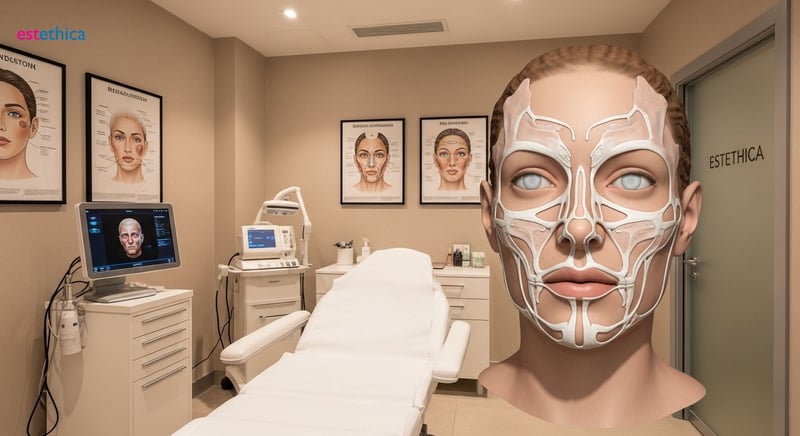Unveiling the Ageless You: A Guide to Facial Rejuvenation
Achieve timeless beauty with expert facelift procedures at estethica, blending advanced surgical techniques with unparalleled patient care.
The pursuit of timeless beauty and youthful vigor is more accessible than ever with advances in facial rejuvenation. This guide explores the transformative world of facelifts, offering insights into rhytidectomy procedures, modern techniques, and recovery processes. Whether you seek to turn back the clock or simply refine your natural beauty, understanding these procedures is the first step in your journey to self-renewal.
Rhytidectomy 101: Understanding the Facelift Procedure
The Facelift Procedure: A Detailed Overview
A facelift, technically known as a rhytidectomy, is a transformative cosmetic surgery designed to rejuvenate the face. The primary goal is to mitigate the visible signs of aging, such as sagging skin, deep wrinkles, and the loss of youthful contours. It addresses these issues by lifting and tightening the underlying facial tissues. During the procedure, incisions are strategically made to allow the surgeon to access and manipulate the skin and muscle beneath.
Excess skin is removed, and the remaining skin is redraped to create a smoother, firmer appearance. Esthetica Global surgeons consider each patient's unique facial structure, skin elasticity, and aesthetic goals to achieve natural-looking results. The benefits of a facelift extend beyond mere physical enhancement; many patients report a significant boost in self-confidence and overall well-being. Facelifts address sagging skin, which can contribute to an aged or tired appearance. The surgery typically involves tightening the underlying muscles and tissues to restore youthful contours.
Key Steps in a Facelift Rhytidectomy
- Anesthesia Administration: Ensuring patient comfort and safety throughout the procedure.
- Strategic Incisions: Carefully placed to minimize visibility and maximize access to underlying tissues.
- Tissue Repositioning: Lifting and tightening the deeper facial structures for a natural rejuvenation.

Beyond the Years: Is a Face Lift the Right Choice for You?
Assessing Your Candidacy for Rhytidectomy
Deciding if a facelift, or rhytidectomy, is suitable involves many factors beyond simply desiring a more youthful appearance. Your overall health plays a crucial role, as certain medical conditions can increase the risks associated with any surgical procedure. For instance, individuals with well-managed chronic conditions such as hypertension or diabetes may still be considered, but those with uncontrolled health issues might face higher risks. Furthermore, skin type and its inherent elasticity are critical considerations, affecting the potential outcomes of the surgery. People with thicker, more elastic skin tend to experience better and longer-lasting results compared to those with thinner, less resilient skin. Esthetica Global professionals conduct thorough evaluations to ensure patient safety and satisfaction.
Realistic expectations are paramount; this procedure refines and rejuvenates existing features, not eliminates aging entirely. While the ideal age range for a facelift is typically between 40 and 60, older adults can also be excellent candidates if they are in good health and have realistic goals. A successful facelift at Esthetica Global requires an understanding that while it can significantly turn back the clock, it will not halt the natural aging process. For example, patients might opt for a facelift to refresh their look before a milestone event, understanding that the procedure will enhance their appearance for years to come but will not prevent future aging changes.
Key Factors Determining Facelift Candidacy
- Overall Health: Good health is essential to minimize surgical risks.
- Skin Elasticity: Thicker, more elastic skin yields better results.
- Realistic Expectations: Understanding the procedure's scope is crucial for satisfaction.

Cosmetic Surgery and the Art of Natural-Looking Facelifts
Achieving Natural Results with Modern Face Lift Techniques
Achieving a natural-looking face lift involves the careful merging of surgical precision and artistic vision. Surgeons at Esthetica Global prioritize techniques that rejuvenate the face while maintaining its inherent characteristics. This approach avoids the 'pulled' or artificial look that was once associated with traditional facelifts. Advances in cosmetic surgery have made it possible to enhance facial rejuvenation subtly, so that the results appear harmonious and balanced. This is particularly important for patients seeking to refresh their appearance without drastically altering their identity.
Techniques such as SMAS (superficial musculoaponeurotic system) lifting address the deeper layers of the face to lift sagging tissues, rather than just tightening the skin. Micro fat grafting, another essential tool, replenishes lost volume in areas such as the cheeks and temples, which contribute to a more youthful and vibrant look. Esthetica Global tailors each procedure to meet the unique needs and aesthetic goals of the individual, ensuring that the results complement their natural facial structure. The goal is always to transform and rejuvenate the face while preserving its original character, helping patients look like refreshed versions of themselves.
Key Techniques for a Natural-Looking Face Lift
- SMAS Lifting: Addresses deeper tissues for a more natural and lasting lift.
- Micro Fat Grafting: Restores lost volume for a youthful and rejuvenated appearance with dermal fillers
- Personalized Approach: Tailoring the procedure to individual facial structure and goals.

The Modern Facelift: Exploring Techniques and Recovery
Trends in Modern Facelift Procedures
Modern facelift techniques prioritize minimal invasiveness and shorter recovery times, diverging significantly from traditional surgical approaches. Endoscopic facelifts, for example, use small incisions and specialized cameras to lift and tighten facial tissues, leading to less visible scarring. This method appeals to patients seeking subtle yet effective enhancements. Mini facelifts focus on specific problem areas, such as the lower face and neck, requiring smaller incisions and resulting in faster recovery than comprehensive cosmetic surgery. Thread lifts, a non-surgical alternative, use dissolvable sutures to lift and contour the face, providing immediate results with minimal downtime. These advancements reflect a growing demand for treatments that fit seamlessly into busy lifestyles. Patients today value natural-looking results and quick recovery periods.
At Esthetica Global, surgeons carefully assess each patient to determine the most appropriate technique, considering factors like skin elasticity, facial structure, and desired outcomes. Modern techniques enable more precise targeting of problem areas, allowing for customized treatment plans that deliver optimal facial rejuvenation. For example, a person in their late forties might benefit from a mini facelift to address early signs of jowling, while someone in their early sixties might opt for an endoscopic facelift to achieve more comprehensive rejuvenation with less downtime than a traditional procedure. Ultimately, modern facelifts are about enhancing natural beauty with the least disruption to daily life.
Facelift Recovery and Post-Operative Care
- Initial Healing Phase: Typically involves managing swelling and discomfort with prescribed medications and cold compresses.
- Wound Care: Requires gentle cleaning and monitoring for signs of infection to ensure optimal healing and minimize scarring.
- Activity Restrictions: Avoiding strenuous activities and prolonged sun exposure is crucial to prevent complications and promote recovery.
Transform Your Look: The Ultimate Facelift Guide
SMAS Lifting and Micro Fat Grafting Expertise for Natural-Looking Facelifts
Patient-Centric Facelift Procedures with Comprehensive Post-Operative Support
Frequently Asked Questions
What is a Rhytidectomy (Facelift) and what does it address?
How do modern Facelift techniques achieve natural-looking results?
What factors determine if I am a good candidate for a Face Lift?
What are the typical steps involved in Face Lift recovery and post-operative care?
How do modern Facelift techniques differ from traditional approaches?
Ready to experience world-class aesthetic and healthcare services tailored to your needs?
📞 Get Your Free Consultation!